Related Research Articles
The original inhabitants of Mauritania were the Bafour, presumably a Mande ethnic group, connected to the contemporary Arabized minor social group of Imraguen ("fishermen") on the Atlantic coast.

Mauritania is a presidential democracy, but has suffered from repeated military coups since its Independence in November 1960. For 18 years after independence, Mauritania was a one-party state under Moktar Ould Daddah. This was followed by decades of military rule. The first fully democratic presidential election in Mauritania occurred on 11 March 2007, which marked a transfer from military to civilian rule following the military coup in 2005. The election was won by Sidi Ould Cheikh Abdallahi, who was ousted by another military coup in 2008 and replaced by general Mohamed Ould Abdel Aziz. Mauretania underwent its first peaceful transition of power after the 2019 presidential election, although this was between two presidents of the ruling UPR party and former army generals.
The Popular Front is a small political party in Mauritania.

Col. Mohamed Khouna Ould Haidalla was the head of state of Mauritania from 4 January 1980 to 12 December 1984.

The Military Council for Justice and Democracy was a supreme political body of Mauritania. It served as the country's interim government following the coup d'état which ousted the President Maaouya Ould Sid'Ahmed Taya on 3 August 2005. It was led by the former Director of the national police force, Colonel Ely Ould Mohamed Vall. After seizing power, it quickly pledged to hold elections within two years and promised that none of its own members would run.
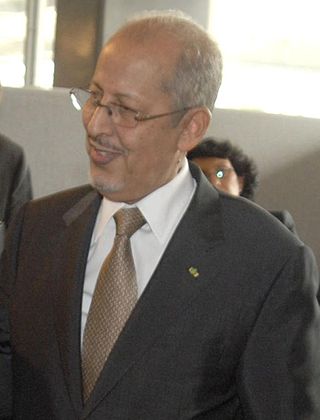
Presidential elections were held in Mauritania on 11 March 2007. As no candidate received a majority of the votes, a second round was held on 25 March between the top two candidates, Sidi Ould Cheikh Abdallahi and Ahmed Ould Daddah. Abdallahi won the second round with about 53% of the vote and took office in April.
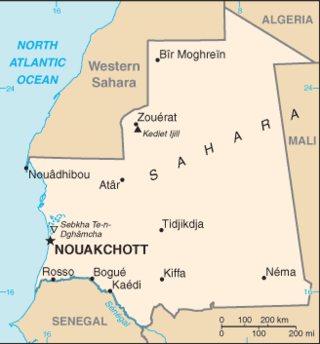
A military coup took place in Mauritania on 3 August 2005. President Maaouya Ould Sid'Ahmed Taya was ousted by the Armed Forces of Mauritania and replaced by the Military Council for Justice and Democracy (CMJD), headed by Ely Ould Mohamed Vall, while Taya was in Saudi Arabia attending the funeral of King Fahd of Saudi Arabia.
Cheikh El Avia Ould Mohamed Khouna is a Mauritanian political figure. He was the 7th Prime Minister of Mauritania from January 2, 1996, to December 18, 1997, Minister of Foreign Affairs from July 12, 1998, to November 16, 1998, and Prime Minister again from November 16, 1998, to July 6, 2003, under President Maaouya Ould Sid'Ahmed Taya; later, he briefly served as Minister of Foreign Affairs again in 2008.
The People's Progressive Alliance is a small political party in Mauritania.
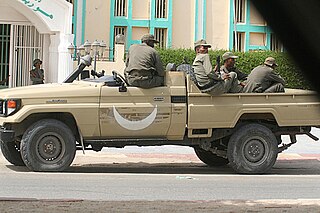
The 2008 Mauritanian coup d'état was a military coup that took place in Mauritania on August 6, 2008, when President Sidi Ould Cheikh Abdallahi was ousted from power by the Armed Forces of Mauritania, led by a group of high-ranking generals he had dismissed from office earlier that day.
Mohamed Lemine Ch'bih Ould Cheikh Malainine is a Mauritanian politician. He has served as a former leader of the Qadiriyya Islamic brotherhood.

Presidential elections were held in Mauritania on 21 June 2014, with a second round planned for 5 July if no candidate received more than 50% of the vote. The result was a first round victory for incumbent President Mohamed Ould Abdel Aziz of the Union for the Republic, who received 82% of the vote. Most of the opposition parties boycotted the election.
Yahya Ould Hademine is a Mauritanian engineer and politician who served as Defense Minister of Mauritania. He served as the Prime Minister of Mauritania from August 21, 2014 to October 29, 2018.
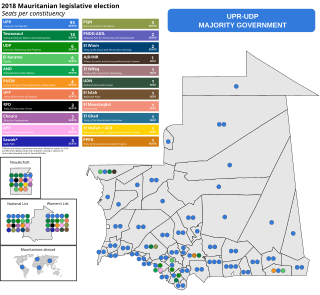
Parliamentary elections were held in Mauritania in September 2018; the first round took place on 1 September, with a second round held on 15 September. At the national level, elections were held in 157 constituencies, each electing one member to the National Assembly. Elections were also held in 13 regional councils and 219 municipalities.

Presidential elections were held in Mauritania on 22 June 2019, with a second round planned for 6 July if no candidate had received more than 50% of the vote. The result was a first round victory for Mohamed Ould Ghazouani who won with 52 percent of the vote. However, opposition rejected the results, calling it "another army coup." On 1 July 2019, Mauritania's constitutional council confirmed Ghazouani as president and rejected a challenge by the opposition.

Mohamed Ould Cheikh Mohamed Ahmed Ould Ghazouani, also known as Ghazouani and Ould Ghazouani, is a Mauritanian politician and retired army general who has served as the 9th President of Mauritania since 2019, and the chairperson of the African Union since February 2024.
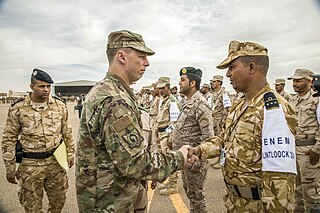
The following lists events in the year 2020 in Mauritania.

Mohamed Ould Bilal, is a Mauritanian politician who served as the prime minister of Mauritania from 6 August 2020 to 2 August 2024.
References
- ↑ "Saudi Ambassador to Mauritania Meets with Parliament's Speaker". Saudi Press Agency.
- ↑ "Ould Baya élu président du parlement mauritanien". BBC News Afrique (in French). 2018-10-09. Retrieved 2022-10-06.
- ↑ "Biography of President of National Assembly". National Assembly of Mauritania. Retrieved 2022-10-06.